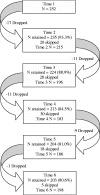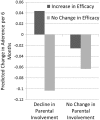Developmental processes associated with longitudinal declines in parental responsibility and adherence to type 1 diabetes management across adolescence
- PMID: 24602891
- PMCID: PMC4027878
- DOI: 10.1093/jpepsy/jsu006
Developmental processes associated with longitudinal declines in parental responsibility and adherence to type 1 diabetes management across adolescence
Abstract
Objective: To identify whether changes in pubertal status and self-efficacy for diabetes management are associated with longitudinal declines in parental responsibility for diabetes, and to determine whether these factors moderate associations between declining parental responsibility and deteriorating adherence across adolescence.
Methods: Adolescents (N = 252; 53.6% females) with type 1 diabetes, mothers, and 188 fathers participated in a 2.5-year longitudinal study. Self-reports of pubertal status, adolescent efficacy, parental responsibility, and adherence were completed every 6 months (6 time points).
Results: Latent growth curve modeling revealed that longitudinal increases in efficacy and pubertal maturation were uniquely associated with longitudinal declines in parental responsibility. Declines in parental responsibility were related to deterioration in adherence especially when adolescents did not report concomitant growth in self-efficacy.
Conclusions: Transfer of responsibility for diabetes management across adolescence may be more optimal when adolescents' increased independence is titrated to their changing self-efficacy beliefs.
Keywords: adherence; adolescents; longitudinal research; parenting; puberty; self-efficacy; type 1 diabetes.
© The Author 2014. Published by Oxford University Press on behalf of the Society of Pediatric Psychology. All rights reserved. For permissions, please e-mail: journals.permissions@oup.com.
Figures


References
-
- Anderson B J, Brackett J, Ho J, Laffel L M. An office-based intervention to maintain parent-adolescent teamwork in diabetes management. Impact on parent involvement, family conflict, and subsequent glycemic control. Diabetes Care. 1999;22:713–721. - PubMed
-
- Bandura A. Self efficacy mechanism in human agency. American Psychologist. 1982;37:122–147.
-
- Cameron F J, Skinner T C, de Beaufort C E, Hoey H, Swift P G, Aanstoot H, Aman J, Martul P, Chiarelli F, Daneman D, Danne T, Dorchy H, Kaprio E A, Kaufman F, Kocova M, Mortensen H B, Njølstad P R, Phillip M, Robertson K J, Schoenle E J, Urakami T, Vanelli M, Ackermann R W, Skovlundt S E, Hvidoere Study Group on Childhood Diabetes Are family factors universally related to metabolic outcomes in adolescents with Type 1 diabetes? Diabetic Medicine. 2008;25:463–468. doi:10.1111/j.1464-5491.2008.02399.x. - PubMed
Publication types
MeSH terms
Grants and funding
LinkOut - more resources
Full Text Sources
Other Literature Sources
Medical

